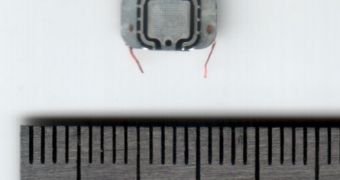RFID chips, in addition to being truly useful in stores, for inventories and the likes, are highly-criticized by human rights groups, because they say that, once inserted in a human being, they can pass on their location, as well as a myriad of personal information, including banking accounts, purchasing habits and the likes. Now, German scientists at the Fraunhofer Institute for Microelectronic Circuits and Systems IMS in Duisburg have sparked another wave of critics, when they invented a chip that could be integrated into metal and still send viable data to a reading device.
RFID devices are usually made up of two pieces, a small tag that is incorporated into the product, animal or human that needs tracing, as well as a reading device, which can gather and process the data of each tag from several meters away.
And therein lies the privacy problem with these chips – the fact that a person could have his or her entire life scanned without even knowing it, as well as have his or her position known by someone at all times. Moreover, while some may argue that this increases their sense of security, that claim is utterly false, considering the fact that the entire system is designed to keep people in check and under control.
No doubt exists that the RFID technique, standing for radio-frequency identification, is useful in industrial processes or in retail stores, where it makes the lives of employees a lot easier. But its employment in these areas should not be merged with its use in humans. The idea of having to carry a passport endowed with such a transmitter already weighs heavy on the people from the European Union, where travel documents hold all the personal information of their carriers.
Such large amounts of information should not be made available to anyone in the world, and no organization, not even the state, should have the power to know so much about its individuals. Furthermore, the fact that terrorism is used in order to instill fear in people's hearts, to make them ask for the implants themselves, is extremely low.
In the end, it's up to each individual to decide what to do with his or her life. However, RFID opponents fear that someday all operations they now perform in their daily lives, such as paying with a credit card, may be replaced by RFID operations, which would basically give the people controlling the implants unlimited power over those wearing them. As soon as one of them “steps out of line,” their chip is closed, and the man or woman finds himself or herself isolated from public services.
And then there's always the issue of hackers, who will clone chips as easily as they clone cards, regardless of thousands of safety features. They are generally incredibly smart people that can easily undo what others, as smart as them, have done in order to protect any electronic device.

 14 DAY TRIAL //
14 DAY TRIAL //